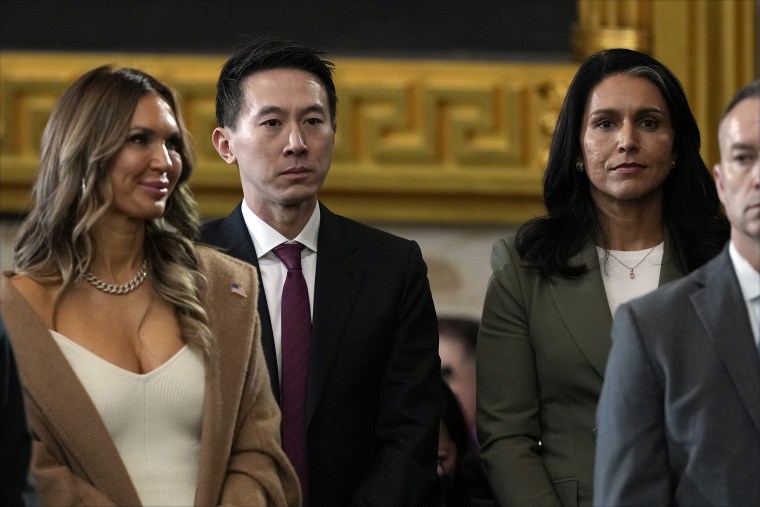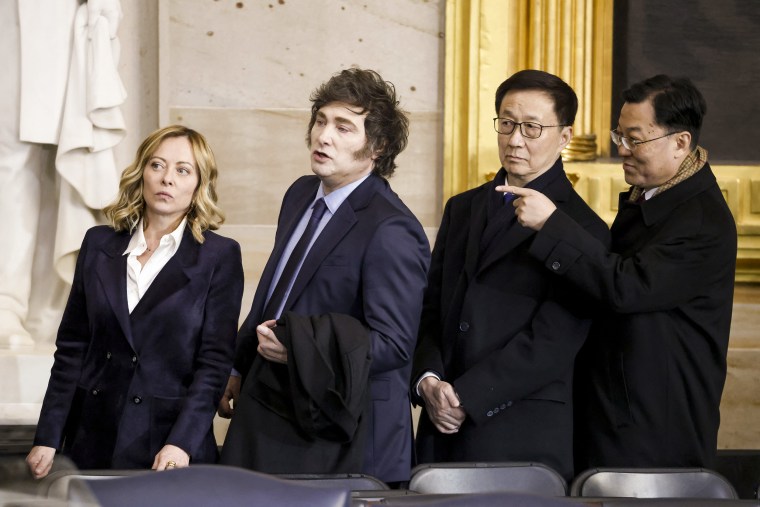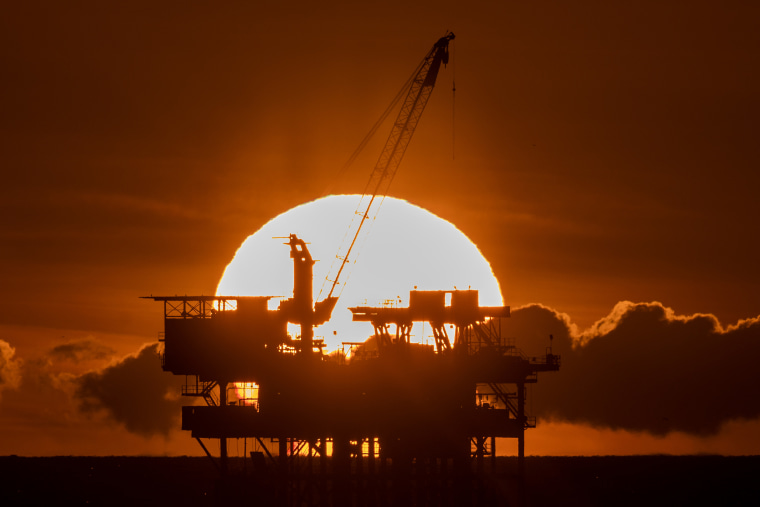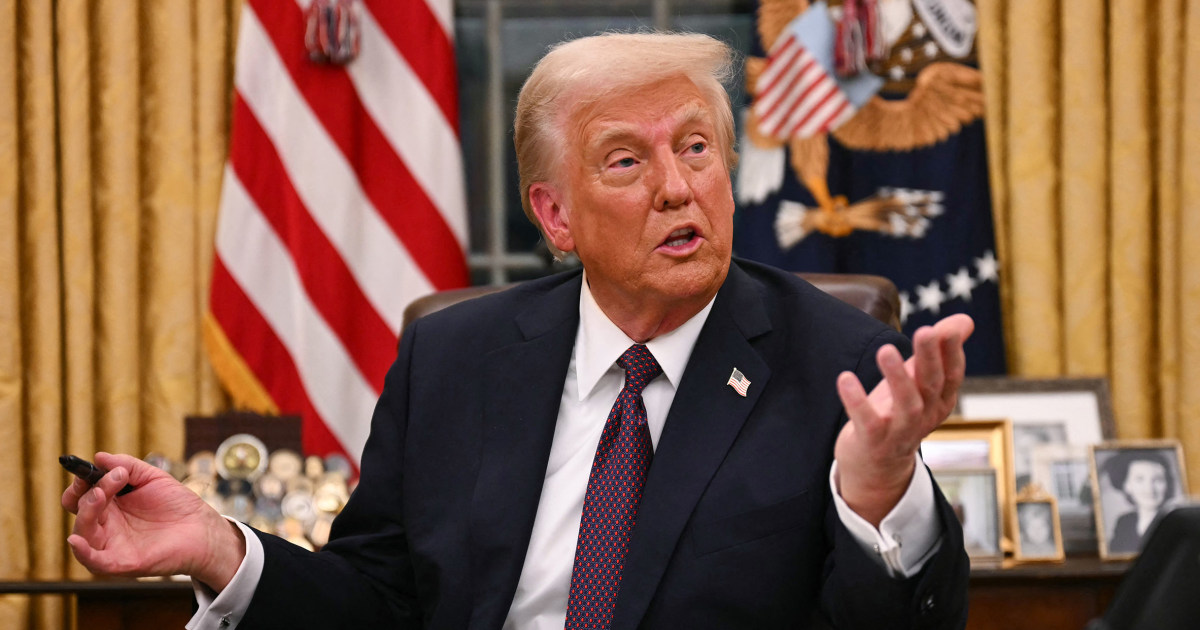LONDON — In a freewheeling Inauguration Day of speeches, casual remarks and formal balls, President Donald Trump wasted no time trying to shape the world in his unmistakable image.
Unlike four years ago, when his term began in a flurry of unpreparedness, this time Trump let fly with a series of actions and statements that seek to scrub many of former President Joe Biden’s decisions and replace them with Trump’s own stark imprimatur.
From tariffs, TikTok and the Middle East to the climate crisis and world health, here are the headlines of Trump’s foreign policy moves during the first 24 hours of a term set to last 1,461 days — and how the world reacted.
Russia
The president previously claimed he would end the Russia-Ukraine war within 24 hours of taking office. “This is only half a day. I have another half a day left,” he said Monday.
That idea sparked alarm in Europe, which worries that Trump could force Ukraine into a negotiation that favors Russian President Vladimir Putin. Trump has more recently stretched this timeline to as long as six months, which some have taken as a signal of support for Ukraine.
On Monday, Trump appeared to criticize Putin — one of the authoritarian leaders he has spoken warmly about in the past, saying he is “not doing so well.”
“It’s not making him look very good,” Trump said of how the war is going for Putin, adding that he was “destroying Russia by not making a deal.”
When asked Tuesday about Trump’s comments, Russian Foreign Minister Sergei Lavrov said that “we respect the choice of the American people” and that “Trump has also repeatedly given reason to say that they also respect the choice of the Russian people.”
Middle East
On the nascent ceasefire between Israel and Hamas, something his team helped broker, the president said he was “not confident” that the truce would last, adding: “That’s not our war. It’s their war.”
U.S. officials credit Trump’s Middle East peace envoy, Steve Witkoff, with helping get that deal over the line.
On Gaza — where Israeli airstrikes have displaced most of the population and killed more than 46,000 people, according to local authorities — he hinted at his real estate background.
“Gaza is like a massive demolition site. That place has really got to be rebuilt in a different way,” he said, adding that “it’s a phenomenal location on the sea, best weather. … Some beautiful things could be done with it.”
Trump also rescinded Biden’s sanctions on Israel settlers in the occupied West Bank, who have been accused of violence against Palestinians.

The president’s first term was characterized by a succession of pro-Israel moves, including moving the U.S. embassy to Jerusalem and ditching the Iran nuclear deal. The 2020 Abraham Accords, establishing relations between Israel and several Middle Eastern and North African countries, was perhaps the first Trump administration’s biggest foreign policy achievement.
North Korea
In South Korea, there was palpable nervousness after Trump referred to North Korea as a “nuclear power.”
U.S. officials have long refrained from using the phrase as it could signal recognition of North Korea as a nuclear-armed state. South Korea said Tuesday that North Korea “can never be recognized” as such.
Among the norm-busting sagas of the president’s first term was his nuclear brinkmanship with North Korean dictator Kim Jong Un. The two traded personal insults and nuclear threats, before Trump told the world that “we fell in love.”
China
While campaigning in 2024, President Trump suggested he could slap a 60% tariff on all Chinese goods, risking a rerun of the Beijing trade war he fought during his first term.
Now he suggests these tariffs could be used to force through a deal in which the U.S. acquires half of the social media platform TikTok. An executive order Trump signed Monday postponed for 75 days a Biden law that requires the Chinese tech giant ByteDance to sell its stake in TikTok or see the platform banned in the U.S.
“The U.S. should be entitled to get half of TikTok,” Trump told reporters. Asked about ByteDance’s close ties with the Chinese government, he said he “could see a deal” in which the U.S. “polices it a little — maybe a lot.”

Chinese Foreign Ministry spokesperson Mao Ning told a news briefing Tuesday that Beijing was “willing to work with the new U.S. administration, adhering to the principles of mutual respect, peaceful coexistence” — perhaps hinting at past clashes.
Europe’s far right
While U.S. inaugurations have historically been largely domestic affairs, figures on the global political right — including some on its extreme hard-right populist fringes — were invited to Washington on Monday.
Among them were lawmakers from Alternative for Germany, a far-right nationalist party under surveillance by Berlin for suspected extremism that Trump ally Elon Musk has recently championed.
Italy’s staunch anti-immigration Prime Minister Giorgia Meloni also attended.

Hungary’s populist prime minister, Viktor Orban, a longtime Trump ally, said Trump’s inauguration would aid the far-right’s political assault on the European Union’s mainstream.
“So the great attack can start,” he said at an event in Budapest. “Hereby I launch the second phase of the offensive that aims to occupy Brussels.”
He is an arch antagonist of European Commission President Ursula von der Leyen, who offered her own assessment.
“We have entered a new era of harsh geostrategic competition,” she said in a speech at the World Economic Forum in Davos, Switzerland. “Breaking the bonds in the global economy is in no one’s interest.”
Climate change
As expected, one of Trump’s first executive orders was to leave the 2016 Paris climate change accord, in which countries agreed to limit post-industrial temperature rises to 1.5 to 2 degrees Celsius (2.7 to 3.6 degrees Fahrenheit).
This will put the United States alongside Yemen, Iran and Libya as nonsignatories to the deal, which Trump said was a “rip-off” but experts say is still humanity’s best hope at limiting catastrophe.
Earlier this month, the Biden administration announced a ban — which would require an act of Congress to reverse — on new offshore oil and gas drilling along most of the U.S. coastline.

Even so, the Paris agreement does not “reflect our country’s values,” the White House said, with Trump instead promising to “drill, baby, drill.”
The WHO
It was likewise anticipated that Trump would junk Washington’s role in the World Health Organization. He has alleged that the global health body aided Chinese government efforts to “mislead the world” over Covid — something both the WHO and Beijing deny.
The U.S. is by far the WHO’s biggest financial backer, providing 18% of its $6.8 billion budget. Signing an executive order to leave the WHO, Trump said that China’s lower contribution but higher population “seems a little unfair to me.”
Experts say that leaving the organization could undermine worldwide programs to tackle diseases such as tuberculosis and HIV/AIDS.

